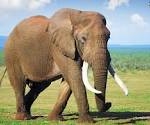Those of us who live in the U.S. know there are big animals in our country—in zoos and in elusive herds in Yellowstone Park, for instance. But in South Africa, big game lives all around people, all of the time. My wife and I spent a couple of weeks there and the closeness of Nature was extraordinary.
in South Africa, big game lives all around people, all of the time. My wife and I spent a couple of weeks there and the closeness of Nature was extraordinary.
Here’s an example: In Zimbabwe in the small town of Victoria Falls (one street and an intersection) we drove through one morning on our way to a game drive safari in Botswana. Our guide pointed to a dozen brown balls about the size of cantaloupe, spread across the main street. Elephant droppings. That meant elephants had browsed along the street during the previous night in spite of banks, markets, and cash machines lining the streets.
 At my suburban home, we saw deer (or their droppings) occasionally but elephants?? The wild game in Africa live close to humans in the rural areas particularly. We use fences in the U.S. to keep our cattle in; they use fences to keep big game—rhinos, elephants, and leopards—out of their yards.
At my suburban home, we saw deer (or their droppings) occasionally but elephants?? The wild game in Africa live close to humans in the rural areas particularly. We use fences in the U.S. to keep our cattle in; they use fences to keep big game—rhinos, elephants, and leopards—out of their yards.
On our game drives we saw hundreds of animals. They were majestic—not only because of their size, but also their pride, freedom, and gracefulness. With the exception of a few fences, they move among humans more than I expected. What does this do to the humans?
- It creates an immediate awareness of how intertwined humans and Nature/big game are. The people certainly have shopping centers and suburbs, but only a short distance away is Nature and big game. These always remind people of our shared existence.
- Many Africans are poor. As a result, big game represents only meat and food for them. To us in the West, we want to preserve the big game. But to many Africans, people and animals are really similar—they both need food to live and will kill without regret in order to eat. The line between humans and Nature is very narrow.
- The extreme weather of South Africa makes survival of both humans and big game difficult. To Western eyes, the fact they both thrive beside each other with pride and independence hints to me of ancient dependency and cooperation between humans and Nature. It even hints at the existence of God to some of us—






